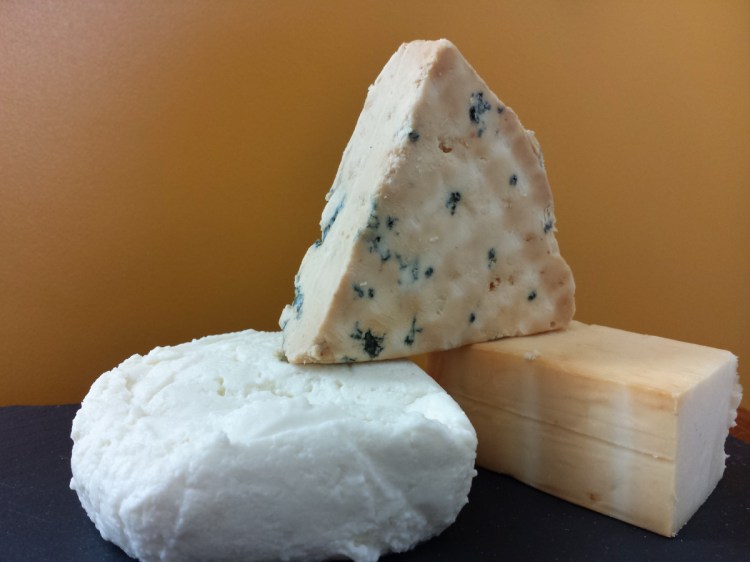In the fall of 2011, I attempted to home-school my kids about the American Revolution from the kitchen table in borrowed digs in Lyon, France. My U.S. history lessons stood on terra firma, I justified, because we’d walked the Freedom Trail before boarding the Air France flight out of Logan Airport. Plus we routinely discussed French alliances as we strolled along Cours Lafayette, making our way to the famed Les Halles de Lyon covered market. There, we’d buy all sorts of cheese made just as it was back when the Marquis de Lafayette cornered Cornwallis, leading up to the Battle of Yorktown.
Yes, I can circle back to cheese from almost anywhere. It’s both a talent and curse, really. Much to my gut’s distress, I sampled a majority of 400 cheeses on offer at the 2007 British Cheese Festival. Since recovering from that bellyache, I’m a more selective lover, gravitating toward stronger cheeses, ones that sate my appetite after a single bite. I adore long-aged cheddars that crackle with crystalline granules; stinky, washed-rind teleggios that ooze onto the cutting board; creamy blues sporting more mold than curd; and anything smoked.
Even we cheese lovers must admit that it’s a product that takes a ton of milk, time and energy to produce. Buying local cheese is often the greenest option, and we lucky Mainers certainly don’t want for local cheesemakers. There are 87 licensed at last count.
In addition to keeping it local, eating strong cheese both sustains my habit and helps keep the overall environmental toll of my cultured dairy products in check. Cooking with stronger cheeses requires between 30 and 50 percent less than milder cheese in the same recipe for it to make its presence known.
It’s easy to find excellent aged cheeses (Hahn’s End’s Eleanor Buttercup, for example), runny, rinded ones (Fuzzy Udder’s Cyclone), and big blues (like Lakin’s Gorges’ Cascadilla Bleu). But I’d not tasted a truly smoked, truly Maine cheese until Brunswick Inn executive chef Ali Waks Adams introduced me to Crooked Face Creamery. As I walked into the inn’s kitchen one day, before she even said “Hello,” she thrust a spoonful of the Up North Applewood Cold Smoked Ricotta in my direction and said “Try this!”, a common occurrence in our food-centric friendship. This small sample was enough to get me hooked on its unique, subtly smoky and lingering flavor. Waks Adams has used this cheese to make ravioli and vegetarian lasagna for her Tuesday night plat du jour dinners.
Grind Stone Neck of Maine, a family-owned and -operated smokehouse in Winter Harbor burns a blend of maple, cherry and beech wood pellets to produce smoked seafood and cheese. But second-generation owner Mason Johnson says he buys the base blue and cheddar cheeses from Wisconsin cheesemakers because he can’t source enough volume of Maine cheese to meet his demand. Pineland Farms sells a smoked cheddar made from local milk at its facility in Bangor (I use it in my mac and cheese), but its label says the added flavor comes from a liquid smoke additive).
Amy Rowbottom of Crooked Face Creamery started making cheese part-time about eight years ago. In her Norridgewock kitchen, she perfected an aged gouda recipe from local Jersey milk and started making fresh ricotta to generate cash flow while she waited for the gouda to ripen, a process that takes a couple of months. She knew the competition for fresh cow and goat milk cheeses in Maine was pretty steep, so Rowbottom was looking for something to set her apart. She worked in sales and website design at Maine Wood Heat Company by day and used one of the company’s idle wood-fired ovens to experiment with cold-smoking cheese, both ricotta and gouda, with local, organic apple wood. The trial rounds of ricotta and wheels of gouda sold well at farmers markets. A grant from the Maine Department of Agriculture allowed her to subsequently fashion a purpose-built cheese smoker that now gives subtly distinctive flavor to three quarters of the cheeses she produces annually. Rowbottom is happy to admit she needs to boost production to meet rising demand. Cheese and smoke, she says, are two worlds colliding in the best possible way.
CHRISTINE BURNS RUDALEVIGE is a food writer, recipe developer and tester and cooking teacher in Brunswick, and the author of “Green Plate Special,” a cookbook from Islandport based on these columns. She can be contacted at cburns1227@gmail.com.
Send questions/comments to the editors.



Success. Please wait for the page to reload. If the page does not reload within 5 seconds, please refresh the page.
Enter your email and password to access comments.
Hi, to comment on stories you must . This profile is in addition to your subscription and website login.
Already have a commenting profile? .
Invalid username/password.
Please check your email to confirm and complete your registration.
Only subscribers are eligible to post comments. Please subscribe or login first for digital access. Here’s why.
Use the form below to reset your password. When you've submitted your account email, we will send an email with a reset code.